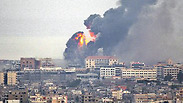
IDF strike in Beirut. The main claim is not against the decision to launch the Second Lebanon War
צילום: איי פי
Leaders' excuses won't rewrite history
Op-ed: Nine years after the Second Lebanon War, its three architects – Ehud Olmert, Amir Peretz and Dan Halutz – are still trying to shift the blame elsewhere.
Nine years after the war, after dozens of military investigations, hundreds of articles and reports, three comprehensive books and one fatal report, the Winograd Report, the three architects of the Second Lebanon War – Ehud Olmert, Amir Peretz and Dan Halutz – look and sound worse than we thought. Worse than we knew.

Instead of retrospective insights, self-examination and acknowledgement of mistakes as part of the opportunity given to them by Channel 10's investigative program "Hamakor," they continue to provide "the dog ate my homework" excuses.
Former IDF Chief of Staff Dan Halutz outdid himself. Halutz, who kept smiling – and it's unclear what made him so happy – claimed that Gadi Eisenkot had told him that "the General Staff would do anything to see him fail." That's a serious statement, by the way, and it would be interesting to hear the current chief of staff's reaction to these words, which can only be defined as collective mud-slinging at his friends in the General Staff.
He reiterated that he had been "blue" in a "green" army. He just failed to mention that by the time he reached the chief of staff's bureau, he had already been a full partner in the General Staff's work for at least 10 years – five years in which he served as the Air Force commander, two years as head of the Operations Directorate, another two years as the deputy chief of staff and a year as the chief of staff. In other words, if he had been surprised, as he repeatedly explained, by the poor situation of the green army, there are two options: Either he failed to understand what was going on around him, or he didn't bother to understand.

Halutz (L), Olmert (center) and Peretz. Instead of self-examination and acknowledgement of mistakes, they continue to provide 'the dog ate my homework' excuses (Photo: Amos Ben Gershom, GPO) (צילום: עמוס בן גרשום, לע"מ)
And so the war, as far as he is concerned, was his first opportunity to discover where he lives and how senior commanders – a significant number of whom he himself appointed, including Northern Command chief Udi Adam – function.
"It's not my army," he says. "I didn't grow up in the ground forces." Or "it's in the command field," and if it's not there, then "it's part of the war's events," like the 12 reserve soldiers killed by a Katyusha rocket in Kfar Giladi.
He was actually "channeled" to the ground offensive in the last three days of the delusional war he managed. He wasn't asked who channeled him, he didn't provide a direct answer in any case, but from Olmert's remarks later on one can understand that Halutz had claimed that those people included the reservists. "They are stamping their feet," Olmert quotes Halutz as saying, explaining to the prime minister that "they are in a dangerous place."
Olmert, who can be given credit for understanding just how bad this move could be, said to him: "So move then back." He also admits at the end of the interview – and he is the only one who does it – that in retrospect, the operation "was unnecessary."
And the conclusion reached by Halutz, who with an elephant's elegance dismisses the comment that he has failed to confront bereaved families – being the first chief of staff who did not see it fit to visit them – is that the northern border has been "calm" since then. There is only one thing to say about that, in Halutz's language: Do me a favor.
And we can only wonder how can it be that after so many years, he has failed to internalize that the main claim is not against the decision to launch the war, as reckless and as careless as it may have been. The main claim has to do with the way it was managed beyond the first days in which it recorded all its achievements – destroying the long-range missile arsenal and critically damaging Beirut's Dahiya Quarter.
A war which ended in 60 hours that sum up all the major problems in the way it was managed: Halutz who was absent from the last discussion because he was sitting in the Channel 10 studio; Peretz who chose to ignore professionals who warned against the operation and lashed out at former defense ministers who "looked down at him," outrageously ignoring his inexperience and the limits of his knowledge; and Olmert, who couldn't find a good answer when Shaul Mofaz asked him what he would say to the bereaved families, and still decided to launch the operation.
In conclusion, the program provides no new facts. Its importance is in the clear message it conveys to all decision makers – the prime minister, the defense minister and the chief of staff: Excuses in retrospect, shifting the blame, wisecracking, as successful as it may be, will not change the picture and will not rewrite history. Not a year later, not nine years later and not even 40 years later.










